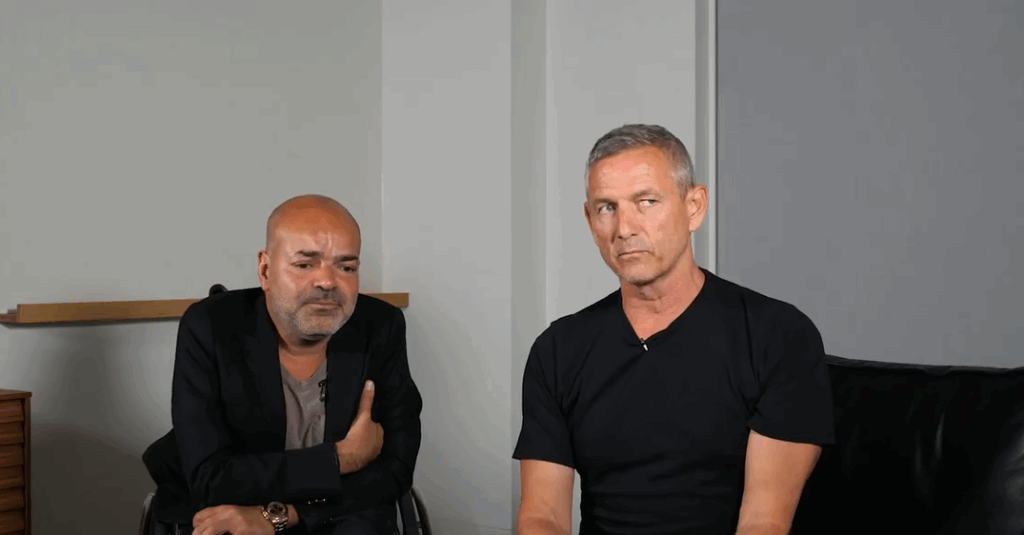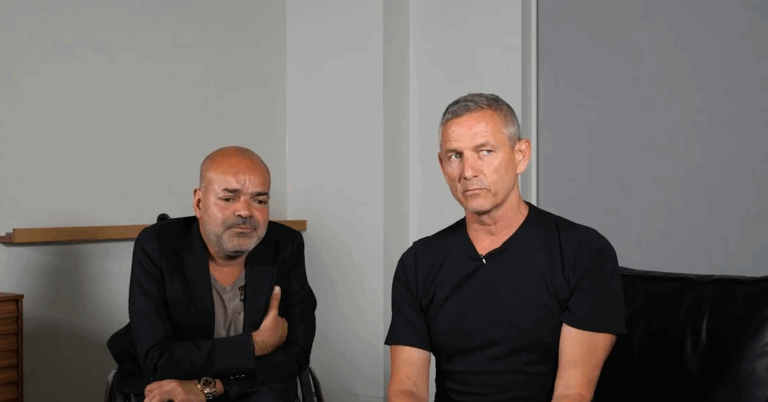Ash Atalla’s career has been characterized by his unwavering honesty, subtly transformative comedy, and razor-sharp wit. But there is a partnership that has oddly gone unnoticed behind the cameras, scripts, and awkward office banter. Throughout the interviews, he makes subtle allusions to his wife—never the main focus or a celebrity-style name, but always with the kind of unwavering love that denotes a relationship based on mutual respect, trust, and everyday life rather than red carpets. Although her presence is rarely made public, it nevertheless influences the subdued cadence of a man who, from a wheelchair, has transformed British television with poise, confidence, and purposeful charm.
Atalla has revealed a little bit about his personal life in recent interviews, such as his emotionally complex conversation with The Guardian in 2024. Speaking openly about time passing, nostalgia, and the coziness of home, he portrayed a picture of modest, thoughtful decisions rather than glamour and extravagance. He related how interior designers recommended incorporating The Office memorabilia into his home’s décor. Rather, he chose a framed photograph of a Slough canal, which is incredibly uninteresting by any standard but profoundly symbolic in its simplicity. In addition to expressing his sense of humor, that selection probably reflects the type of partnership he and his wife have, which is based on deliberate understatement.
Atalla’s remarkably acute sense of timing and narrative has influenced British comedy over the last 20 years. His productions, from The IT Crowd’s chaotic charm to The Office’s awkward silences, achieve a unique balance between the heartbreakingly real and the ridiculous. The emotional fortitude he needs in his own life is frequently reflected in that balance. He was left a wheelchair user after contracting polio as a child in Cairo, a fact that influenced his identity from an early age. Interestingly, though, he never let it become a barrier. Although he doesn’t avoid discussing disability in his comedy, it doesn’t let it define him.
Ash Atalla – Personal and Career Profile
| Attribute | Details |
|---|---|
| Full Name | Ash Atalla |
| Date of Birth | June 18, 1972 |
| Age | 53 (as of 2025) |
| Nationality | Egyptian-born British |
| Birthplace | Cairo, Egypt |
| Education | University of Bath (Business & Finance) |
| Notable Roles | TV Producer, Roughcut TV Founder |
| Known For | The Office (UK), The IT Crowd, Man Stroke Woman, People Just Do Nothing |
| Health | Uses a wheelchair due to polio contracted as an infant |
| Estimated Net Worth | Private |
| Marital Status | Married (public references to wife, occasionally called Adele) |
| Official Bio | www.en.wikipedia.org/wiki/Ash_Atalla |

Although his wife is rarely mentioned in public, she has occasionally been quoted and featured in short stories. Most famously, in a 2018 Times article, she was fictionalized in a metaphor about tranquil beginnings. When he jokes that people frequently forget he’s Egyptian because the wheelchair takes visual precedence, it’s also a moving reference to her. Despite their briefness, these allusions share a remarkably similar tone: they are tender, loving, and free of performative love. In a field where celebrities are frequently expected to reveal every aspect of their personal lives, that nuance is especially welcome.
While many people suffered from loneliness during the pandemic, Atalla was remarkably open about the psychological effects of time and change. He acknowledged that he cried easily and that he was especially sentimental, especially about the years that were passing silently. In a long-term relationship, these feelings are a reflection of a deeper intimacy that exists in ordinary acts of humor and patience rather than being staged for publicity. Even though it isn’t stated, his wife’s support is implied by the way he talks about his house, his daily activities, and even the soft sadness that arises when he considers how far he has come.
Atalla made the move from successful producer to independent creator in 2007 when he founded Roughcut TV. He was able to mold films like Trollied, Cuckoo, and People Just Do Nothing according to his wishes thanks to the audacious and especially creative move. Even though that career change was widely praised, the choice probably needed personal stability, which is something that committed partnerships frequently offer. A partner who provides quiet reassurance and keeps life grounded while ambition soars is frequently hidden behind such calculated risk.
Atalla and his spouse represent a narrative in disability representation that is rarely featured in tabloids. There are no emotional TV appearances or over-the-top heroics, only a subtly resolute refusal to conform to social norms. Atalla once said that he used to make sure people noticed him in a wheelchair by being loud. That awareness, along with an emotional intelligence that is uncommon in entertainment, implies that his relationship is an act of mutual advocacy rather than merely a romantic one.
Their connection is especially compelling because it doesn’t make much of an effort to persuade us. No joint brand deal, no carefully planned appearances during award season, and no carefully manicured Instagram account. Despite being extremely private, the relationship feels surprisingly genuine. His wife might prefer it that way—choosing impact over attention—whether she is Adele or someone the public hasn’t really met yet.
Atalla has maintained her composure in the face of criticism in recent years for handling delicate subjects in comedy. Although he acknowledges the tension, he is not alarmed by it either. His life experience has shaped his comedic instinct, which is still remarkably strong. Perhaps a home life that isn’t disturbed by every tweet or hot topic shapes that balance in addition to professional acumen.
One might anticipate greater insight into Atalla’s life in the future as Roughcut TV grows and his influence grows. However, it’s reasonable to assume that his wife will continue to be a quiet constant given historical trends. Perhaps that is the most amazing aspect of their tale. In a time when visibility is frequently confused with worth, they have created something remarkably robust that is mostly off-camera.


